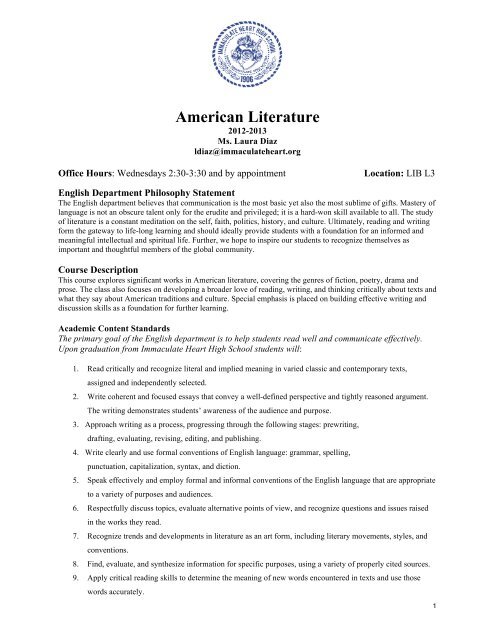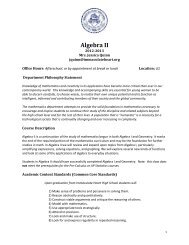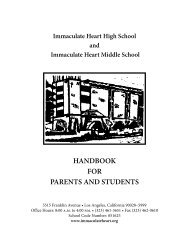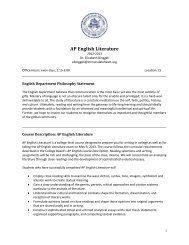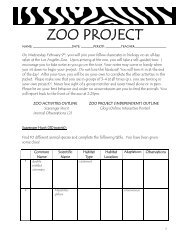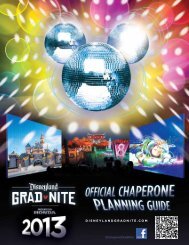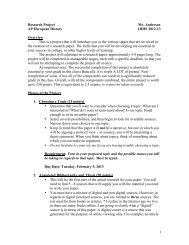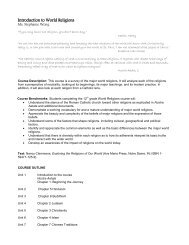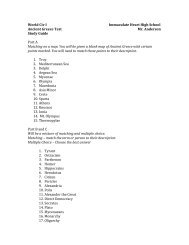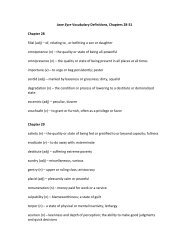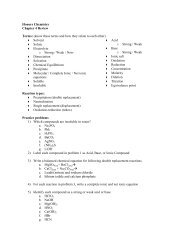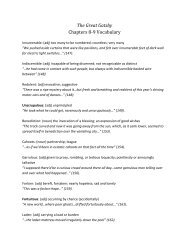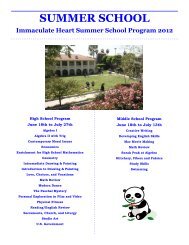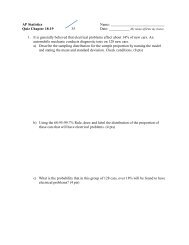Syllabus - Immaculate Heart High School
Syllabus - Immaculate Heart High School
Syllabus - Immaculate Heart High School
Create successful ePaper yourself
Turn your PDF publications into a flip-book with our unique Google optimized e-Paper software.
American Literature<br />
2012-2013<br />
Ms. Laura Diaz<br />
ldiaz@immaculateheart.org<br />
Office Hours: Wednesdays 2:30-3:30 and by appointment<br />
Location: LIB L3<br />
English Department Philosophy Statement<br />
The English department believes that communication is the most basic yet also the most sublime of gifts. Mastery of<br />
language is not an obscure talent only for the erudite and privileged; it is a hard-won skill available to all. The study<br />
of literature is a constant meditation on the self, faith, politics, history, and culture. Ultimately, reading and writing<br />
form the gateway to life-long learning and should ideally provide students with a foundation for an informed and<br />
meaningful intellectual and spiritual life. Further, we hope to inspire our students to recognize themselves as<br />
important and thoughtful members of the global community.<br />
Course Description<br />
This course explores significant works in American literature, covering the genres of fiction, poetry, drama and<br />
prose. The class also focuses on developing a broader love of reading, writing, and thinking critically about texts and<br />
what they say about American traditions and culture. Special emphasis is placed on building effective writing and<br />
discussion skills as a foundation for further learning.<br />
Academic Content Standards<br />
The primary goal of the English department is to help students read well and communicate effectively.<br />
Upon graduation from <strong>Immaculate</strong> <strong>Heart</strong> <strong>High</strong> <strong>School</strong> students will:<br />
1. Read critically and recognize literal and implied meaning in varied classic and contemporary texts,<br />
assigned and independently selected.<br />
2. Write coherent and focused essays that convey a well-defined perspective and tightly reasoned argument.<br />
The writing demonstrates students’ awareness of the audience and purpose.<br />
3. Approach writing as a process, progressing through the following stages: prewriting,<br />
drafting, evaluating, revising, editing, and publishing.<br />
4. Write clearly and use formal conventions of English language: grammar, spelling,<br />
punctuation, capitalization, syntax, and diction.<br />
5. Speak effectively and employ formal and informal conventions of the English language that are appropriate<br />
to a variety of purposes and audiences.<br />
6. Respectfully discuss topics, evaluate alternative points of view, and recognize questions and issues raised<br />
in the works they read.<br />
7. Recognize trends and developments in literature as an art form, including literary movements, styles, and<br />
conventions.<br />
8. Find, evaluate, and synthesize information for specific purposes, using a variety of properly cited sources.<br />
9. Apply critical reading skills to determine the meaning of new words encountered in texts and use those<br />
words accurately.<br />
1
Benchmarks and Performance Standards<br />
Example: Students who have successfully completed English I will able to:<br />
• Demonstrate in writing and discussion a more sophisticated understanding of literary texts (Content<br />
Standards 1, 2, 5).<br />
• Refine the writing of effective expository essays that include three body paragraphs, an introduction, and a<br />
conclusion (Content Standards 2, 3).<br />
• Participate in class discussions, oral presentations, and creative projects that encourage them to confidently<br />
articulate their points of view based on a deeper understanding of the text (Content Standards 1, 4, 5, 6).<br />
• Demonstrate familiarity with the major periods and authors found in American Literature (Content<br />
Standard 6).<br />
• Use reading comprehension strategies to critically explore various literary genres (Content Standards 1, 6,<br />
8)<br />
• Use and properly cite appropriate text and Internet sources (Content Standard 7).<br />
• Informally critique books of their own choosing for personal pleasure and enrichment (Content Standards<br />
1).<br />
Required Materials<br />
The English Department requires that you bring to class before the end of the first week of school your own<br />
unmarked copies of all the texts listed here. You must also ensure that you purchase the specified edition of each<br />
text. Please consult the Follett Books website for each book’s ISBN----an identifying number that will help you<br />
distinguish between different editions of the same text.<br />
IH American Literature Course Reader<br />
The Scarlet Letter by Nathaniel Hawthorne<br />
Fences by August Wilson<br />
The Great Gatsby by F. Scott Fitzgerald<br />
MLA Handbook for Writers of Research Papers, Seventh Edition<br />
Blue or black pens<br />
Pencils for marking in your text<br />
Paper/one-subject notebook (college ruled)<br />
One-inch 3 ring binder<br />
In addition to the above texts, I will periodically assign handouts for the purpose of enriching the core readings.<br />
These handouts will be considered mandatory texts.<br />
**It is imperative that you bring your supplies and the text that we are studying every day!<br />
Classroom Expectations:<br />
• Participation: I expect each of you to complete all of the assigned readings and all of the written<br />
assignments on time. You must come to each class period prepared to engage in class discussions and class<br />
activities. Your final grade may be raised ½ grade for excellence in participation, or lowered ½ grade for<br />
deficiency.<br />
• Web Pages: The syllabus for this course, as well as general information about the English Department,<br />
may be found on the school’s web page. Specific information about the daily work for this course may be<br />
found on my web page. I expect you to check this page daily.<br />
• Make-Up Work: Please avoid tardiness and keep unnecessary absences to a minimum. If you do miss a<br />
class, it is your responsibility to find out what you missed and how to make it up. You can refer to my<br />
webpage to find all of the assignments and the work covered in class. You have one day to make up work<br />
missed due to an absence.<br />
<br />
2
• Late Work: All written assignments must be completed by the due date. Your grade will be lowered a<br />
full letter grade for each day that it is late (an A becomes a B becomes a C and so on). Extensions may be<br />
granted if you ask me in advance of the due date, but I reserve the right to deny you one as well.<br />
• Academic Integrity: Plagiarism is the intentional or unintentional use of someone else’s WORDS or<br />
IDEAS without giving proper credit. This includes paraphrasing a source without giving due credit.<br />
See your MLA Handbook for more information about what constitutes plagiarism. Plagiarism is a<br />
serious breach of academic integrity and any assignment containing plagiarism will receive a grade<br />
in the “F” range. <br />
• Test Return Policy: English teachers keep summer reading tests, vocabulary tests, and objective final<br />
exams so that assessment questions are field tested and can be revised when necessary. This practice<br />
allows the department to reuse most parts of an exam for comparism on achievement from ear to year and<br />
to ajust the emphasis of instruction when required. Students may access their past tests by making<br />
arrangments with their teacher.<br />
• Other classroom rules: No food or drinks (with the exception of water) are allowed in class. Students are<br />
expected to follow all school rules and regulations as outlined in the <strong>Immaculate</strong> <strong>Heart</strong> <strong>High</strong> <strong>School</strong><br />
Student Handbook, as well as exhibit mature and appropriate behavior.<br />
All classroom rules and regulations regarding conduct, attendance, dress code, grading, plagiarism, etc. shall be<br />
implemented and followed as stated in the school handbook.<br />
Types of Assignments:<br />
• Writing: You will respond in writing to most of the major and some of the minor works we study. You<br />
will also write timed, in-class essays and paragraphs. You will work on various projects and presentations<br />
that involve writing. All essays must be word-processed and include a properly formatted works<br />
cited/consulted page. Please refer to the English Department rubric for essays for a more detailed<br />
understanding of what is expected of you.<br />
You must upload all essays and any other specified assignments to the website: www.turnitin.com. You<br />
will need to set up a user profile using a valid e-mail account. You will also need the appropriate class ID<br />
number and enrollment password designated for your class period. You must upload all of your written<br />
work to Turnitin or you will not receive credit for your work. Keep the digital receipt you receive to<br />
prove you uploaded your work.<br />
Period Class ID Enrollment Password (case<br />
sensitive)<br />
4 5351173 Scarlet<br />
6 5354770 Scarlet<br />
• Homework: You should plan on spending about an hour per day reading, writing, revising work, or<br />
completing homework for this class. Some days will be heavier than others—especially if you do not plan<br />
ahead on long-term assignments. Do plan ahead! You will have regular homework assignments involving<br />
reading, writing, and other activities.<br />
• Vocabulary Development: You will work on developing your vocabulary because it is essential for<br />
reading comprehension and effective writing as well as for the PSAT and SAT. It is wise to always have a<br />
pocket dictionary with you in class. Periodically, you will be tested on vocabulary words.<br />
<br />
3
Grading Policy:<br />
Grades are computed on a point system with, for example, essays worth 100; exams, 50-100 (excluding the final<br />
exam); projects, 20-80; quizzes, 5-25; and homework, 5-20. As noted above, participation can raise or lower this<br />
grade by one half (e.g., B to B+ or B-). Late work can also affect your final grade.<br />
100-93 A 89-87 B+ 79-77 C+ 69-67 D+ 59-0 F<br />
92-90 A- 86-83 B 76-73 C 66-63 D<br />
82-80 B- 72-70 C- 62-60 D-<br />
Course Chronology:<br />
First Semester<br />
Summer Reading test and mini-essay: The Catcher in<br />
the Rye<br />
American Struggles and Dreams<br />
Values<br />
• Jiménez: “The Circuit”<br />
• Douglass: from Narrative<br />
Virtues<br />
• Franklin: from The Autobiography<br />
Heritage & Identity<br />
• Tan: “Two Kinds”<br />
• Walker: “Everyday Use”<br />
• Whitman, Hughes, de Hoyos: Selected Poems<br />
Divisions<br />
• Bierce: “An Occurrence at Owl Creek<br />
Bridge”<br />
• Chief Joseph: “I Will Fight No More Forever”<br />
• Dunbar: “We Wear the Mask”<br />
Forging Frontiers<br />
• Colt: “Heading West”<br />
• Twain: “The Californian’s Tale” & “Fetch<br />
Her Out!”<br />
Gender Relations<br />
• Twain: “Aurelia’s Unfortunate Young Man”<br />
• Chopin: “The Story of an Hour”<br />
• Gilman: “The Yellow Wallpaper”<br />
• Hurston: “Sweat”<br />
• “Sexual Politics of Sickness”<br />
Isolation & Alienation<br />
• Steinbeck: “The Turtle”<br />
• Viramontes: from Under the Feet of Jesus<br />
• Eliot: “The Love Song of J. Alfred Prufrock<br />
• Hemingway: “Soldier’s Home”<br />
The American Dream<br />
• Fitzgerald: The Great Gatsby<br />
Second Semester<br />
Religion in American Life:<br />
• Bradstreet: Selected Poems<br />
• Edwards: from Sinners<br />
• Irving: “The Devil and Tom Walker”<br />
• Hawthorne: The Scarlet Letter<br />
• O’Connor: “A Good Man is Hard to Find”<br />
Humans and Nature<br />
• Iroquois Constitution<br />
• Jewett: “A White Heron”<br />
• Crane: “The Open Boat”<br />
• Emerson: from “Self Reliance” and “Nature”<br />
• Thoreau: from “Walden”<br />
• Dickinson and Whitman: Selected Poems<br />
Politics and Voice:<br />
• Equiano, Jacobs, Douglass: Slave narratives<br />
• Declaration of Independence<br />
• Petitions For Freedom<br />
• “Rebellion on the Amistad”<br />
• Thoreau: from “Civil Disobedience”<br />
• King, Jr.: from “Letter from Birmingham Jail”<br />
• Harlem Renaissance: Selected Poems<br />
Overcoming Conflict:<br />
• O’Connor: “Everything That Rises Must<br />
Converge”<br />
• Wilson: Fences<br />
Final Exam:<br />
Essay on Fences<br />
Final Exam:<br />
Essay on The Great Gatsby<br />
<br />
4


